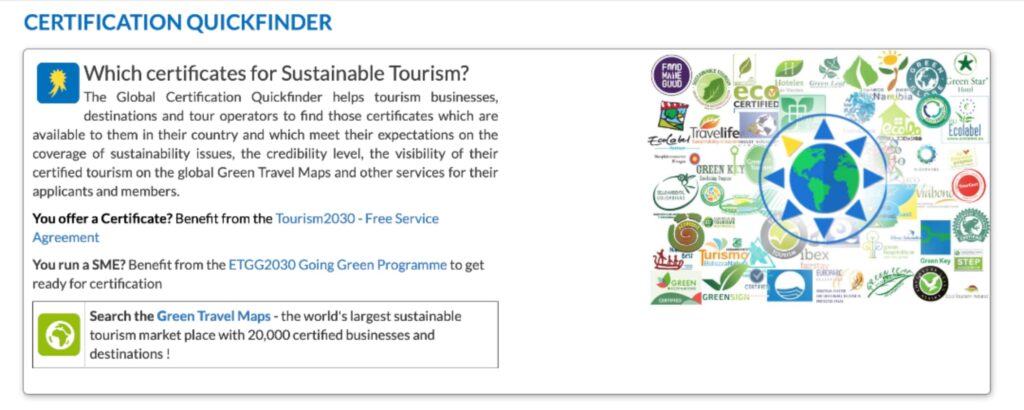Understanding Certifications in Sustainable Tourism and Event Management
- Team
- Jun, 09, 2023
- Sustainable Tourism
- No Comments

Dive into the world of sustainability certifications! Discover the crucial differences between the various types of certification and learn to navigate your way to sustainability with confidence. Start your dive here and improve your informed choices!
Understanding Certifications in Sustainable Tourism and Event Management
In the world of sustainable tourism and event management, certification schemes play a crucial role in assuring quality and establishing trust. The vast array of certification schemes available, however, can sometimes seem bewildering. Understanding the structure and categorisation of these schemes can help both businesses and consumers make more informed decisions.
What you will read in this article:
- Result-based vs. process-based certifications
- Trustworthiness of certifications: The role of auditing parties
- GSTC-recognised and GSTC-accredited certifications
- Choosing the right certification

Result-based vs. process-based certifications
Certification schemes generally fall into two main types: result-based and process-based.
Results-based certifications focus on the outcomes or results of actions. They assess whether, for example, a company has achieved certain sustainability standards or targets, leaving no or very little room for partial compliance. For example, an result-based requirement could be that a company achieves 100% LED lighting. Achieving 70% would not be considered sufficient, as the standard is binary – either it is met or it is not. A notable example of a results-based certification is the Rainforest Alliance certification, which assesses the environmental, social and economic impacts of companies in the tourism industry.
On the other hand, process-based certifications are concerned with the methods or processes a company uses to achieve sustainability. They focus on continuous improvement and adherence to best practices. For instance, if a company has a plan to progressively increase the amount of LED lighting by 10% every year, a process-based certification would evaluate this commitment and the plan’s implementation. ISO 14001, an international standard for environmental management systems, is an example of a process-based certification. It assesses a company’s process of managing its environmental responsibilities and ensuring that these processes align with established sustainability goals.
Result-based certifications do indeed provide a clear and comparable measurement of a company’s or destination’s sustainability performance. They allow for easy comparison between different facilities and show who is more advanced in their sustainability efforts.
In contrast, process-based certifications focus on the implementation of sustainability procedures and continuous improvement, which makes direct comparisons difficult. A company can obtain process-based certification whether it is at the beginning of its sustainability journey or already well advanced in its practices. Certification indicates a commitment to a process, but says nothing about the extent of progress or achievements in sustainability. Therefore, it can be difficult for outsiders to see these differences based on process-based certification alone.

Trustworthiness of certifications: The role of auditing parties
Certification audits can be conducted by first, second, or third parties, each bringing a different level of trustworthiness.
- First-party audits are internal checks by the organisation aiming for certification. Although convenient, they may lack impartiality. For example, a hotel seeking a sustainability certification might assess its own energy and waste management practices, but the absence of an external auditor could raise questions about the objectivity of the results.
- Second-party audits are performed by entities that have a relationship with the organisation being audited, like business partners or clients. While this type of audit can enhance trust due to the involved party’s familiarity with the organisation’s operations, there’s a risk of partiality. For instance, a travel agency conducting audits on the hotels it partners with, or a corporate event sponsor assessing the sustainability practices of the event organiser, are examples of second-party audits. In these scenarios, the auditor’s vested interest in the audited party could potentially influence the audit’s outcome.
- Third-party audits are carried out by independent, external organisations that have a high level of credibility due to their impartiality and thoroughness. Green Destinations and Travelife, for example, are recognised organisations that offer third-party certifications for sustainable tourism. They have rigorous standards and procedures to ensure that businesses meet high sustainability benchmarks. In the field of sustainable event management, “Hållbart Evenemang“, a Swedish event certification scheme, is a leading example of third-party auditing and underlines the commitment to sustainability in the event industry.
GSTC-recognised and GSTC-accredited certifications
The Global Sustainable Tourism Council (GSTC) has established criteria for sustainable tourism and offers recognition or accreditation to certification schemes that align with these criteria.
GSTC-recognised certification schemes use criteria that are consistent with GSTC standards. However, the auditing process and strictness of these certifications can vary widely, as the GSTC does not assess the auditing methods. Therefore, although these certifications ensure certain sustainability standards, their quality can vary greatly.
GSTC-Accredited certifications, in contrast, adhere not only to GSTC’s criteria but also follow GSTC’s auditing process. These certification schemes have been evaluated and approved by GSTC for their process, making them highly credible and reliable. An example is the Green Destinations Standard.

Choosing the right certification
When deciding which type of certification to choose, companies and destinations should consider their specific needs, goals, and the message they want to convey to their stakeholders.
If a company is at the early stages of its sustainability journey and is looking to structure its efforts around best practices, a process-based certification like ISO 14001 may be the most appropriate. This type of certification can provide a roadmap for continuous improvement and demonstrate the organisation’s commitment to sustainability.
On the other hand, if a company or destination has already implemented substantial sustainability initiatives and wants to showcase specific achievements, a result-based certification may be more suitable. These certifications, such as those provided by Green Destinations or Travelife, provide clear, comparable measurements of sustainability efforts that can be communicated to stakeholders.
In terms of trustworthiness and credibility, third-party audits are highly recommended. Certifications like Travelife for tour operators, Green Destinations Standard for tourism destinations, or “Hållbart Evenemang“ (Swedish for sustainable events) for event management, provide the highest level of credibility due to their impartial and thorough audits.
Finally, for businesses in the tourism sector, opting for certifications that align with the GSTC criteria or even better, those that are GSTC-Accredited, is highly advisable. The GSTC criteria represent the highest standard for sustainable tourism certification and enjoy global recognition and respect. GSTC-accredited certifications not only align with these rigorous standards but also adhere to GSTC’s auditing process, offering the highest credibility and reliability.



